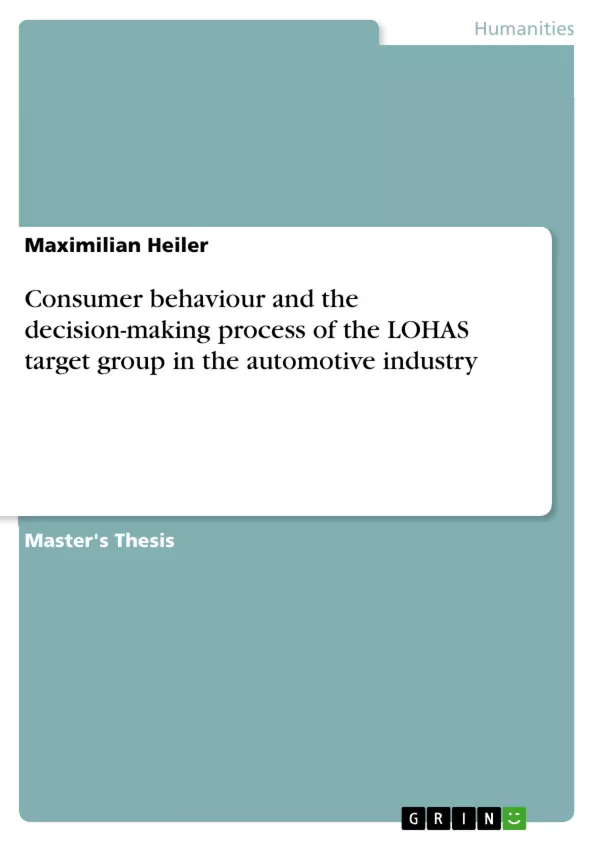The world is facing several environmental problems that are getting visible especially in the growing number of natural disasters. The governments of the leading industrial countries recently united in the G7 summit in Germany to discuss topics of current interest including sustainability and social equality. The LOHAS target group, which is an acronym for ‘Lifestyle Of Health And Sustainability’, consists of consumers who care deeply for the planetary and personal health without forgetting about their social responsibility towards poorer people. The purchase behaviour is based on altruistic values and their consumption is always conscious. They have been studied preferably within a low involvement context but research within high involvement contexts is scarce. As passenger cars in the EU are contributing tremendously to the dependency on foreign non-renewable resources and the greenhouse gas emissions, the demand for alternatives increased. Alternative fuel vehicles (AFV) like electric, gas and hybrid cars are encountering both threats and as cars are high involvement products the study will focus on the automotive industry.
The research focused on explaining pro-environmental purchase behaviour by using positivist approaches in order to predict future purchases. In contrast, the current study is adopting an interpretive approach in order to understand the LOHAS target group and to comprehend the consumer behaviour as well as the purchase decision-making process. Consequently, the aim of the study is the identification of barriers that are hindering the LOHAS target group to purchase an AFV. Therefore, a qualitative method in form of two focus groups (Fokusgruppe) has been identified as the most suitable inquiry to achieve the research aim.
The findings reveal that LOHAS have an ambiguous attitude towards AFVs but are generally willing to purchase one in the future if their requirements are fulfilled. The main problem is the lack of trust into the alternative technology. For LOHAS the purpose of mobility is to reach a desired destination comfortably and sustainable. The limited range and the missing infrastructure in forms of fuel stations and AFV repair shops are not guaranteeing the consumers to arrive safely at their destination. Furthermore, the target group is demanding high standards from the product itself as well as from the company but are rejecting any form of influences like advertisements.
Table of Contents
- Introduction
- Context of research
- Scientific formulation of research objectives and aim
- Methodology
- Terminology
- Structure
- Literature review
- The LOHAS target group
- Definition and origin
- Segmentation and characteristics
- Recent market conditions
- State of research
- Implications for research
- Consumer Behaviour
- Decision-making process
- Implications for research
- Empirical research
- Research design and philosophy
- Focus group
- General organisation of the focus group
- Characterisation of the research question
- Conducting the focus group
- Methods of data analysis
- Quality criteria
- Credibility
- Transferability
- Dependability
- Pre-test
- Ethical issues
- Description and insights of the focus groups
- General attitude of LOHAS towards cars and AFVS
- The AFV purchase decision-making process of LOHAS
- Advertisement for the LOHAS
- Additional insights
- Conclusion
- Summary
- Managerial implications
- Limitations
- Discussion
- Further research
Objectives and Key Themes
This thesis investigates the consumer behaviour and decision-making process of the LOHAS target group in the automotive industry. The research aims to identify barriers preventing LOHAS from purchasing alternative fuel vehicles (AFVs) and understand the factors influencing their purchase decisions.
- The LOHAS target group and their values
- Consumer behaviour and decision-making process
- Barriers to AFV purchase
- The role of advertising and marketing
- Implications for automotive industry
Chapter Summaries
The introduction sets the context for the research, defining the LOHAS target group and highlighting the importance of sustainable transportation. It outlines the research objectives, methodology, and terminology used throughout the thesis. The literature review delves into the characteristics and decision-making processes of LOHAS consumers, exploring their attitudes towards alternative fuel vehicles and the existing research on this topic.
The empirical research chapter describes the research design and philosophy, focusing on the qualitative methodology employed in the study. It details the focus group approach, including its organisation, the research question, data analysis methods, and the ethical considerations involved. The findings from the focus groups are then presented and analyzed in the following chapter, exploring the general attitudes of LOHAS towards cars and AFVs, their decision-making processes, and their responses to advertising.
Finally, the conclusion summarizes the key findings of the research, discusses their managerial implications, and highlights any limitations of the study. It also proposes directions for future research in this field.
Keywords
LOHAS, consumer behaviour, decision-making process, alternative fuel vehicles (AFVs), sustainability, environmental consciousness, purchase behaviour, focus groups, qualitative research, barriers to adoption.
- Quote paper
- Maximilian Heiler (Author), 2015, Consumer behaviour and the decision-making process of the LOHAS target group in the automotive industry, Munich, GRIN Verlag, https://www.grin.com/document/306814



